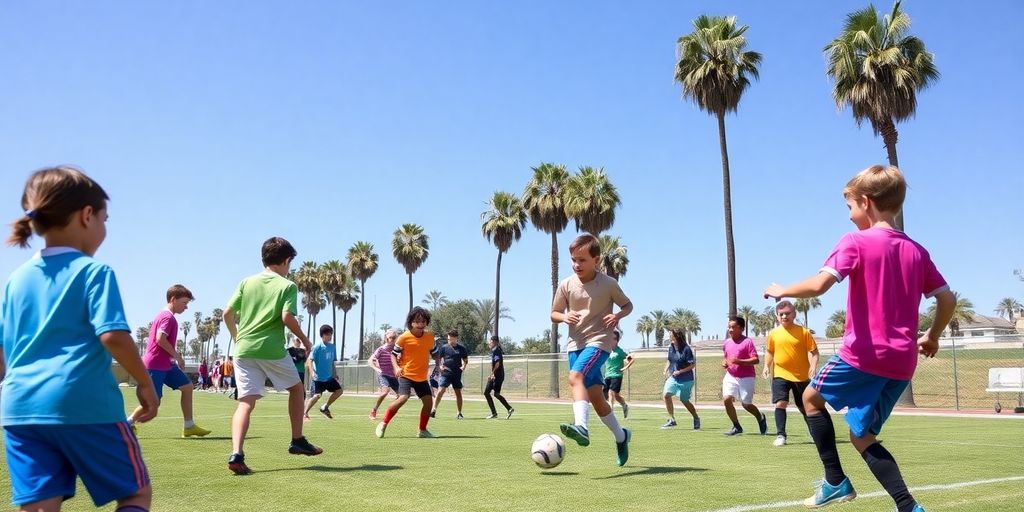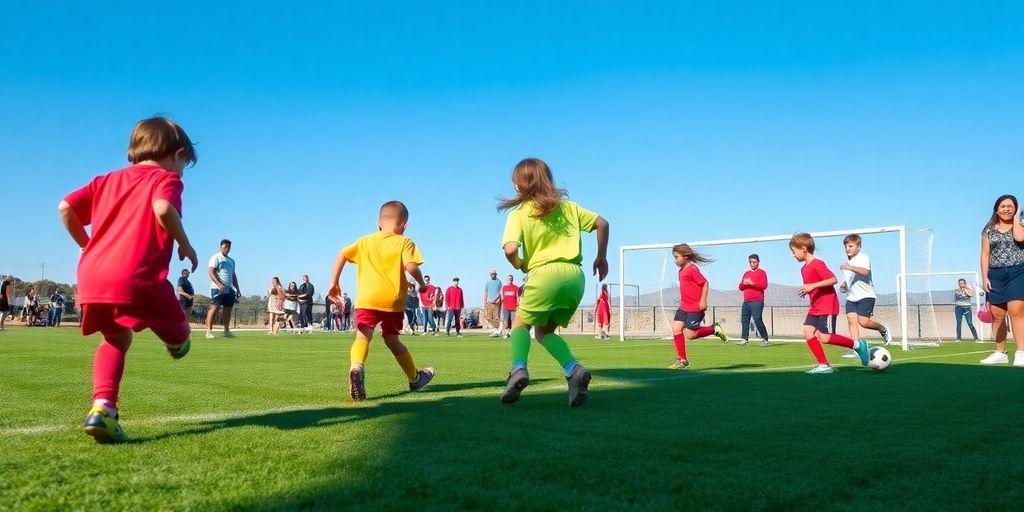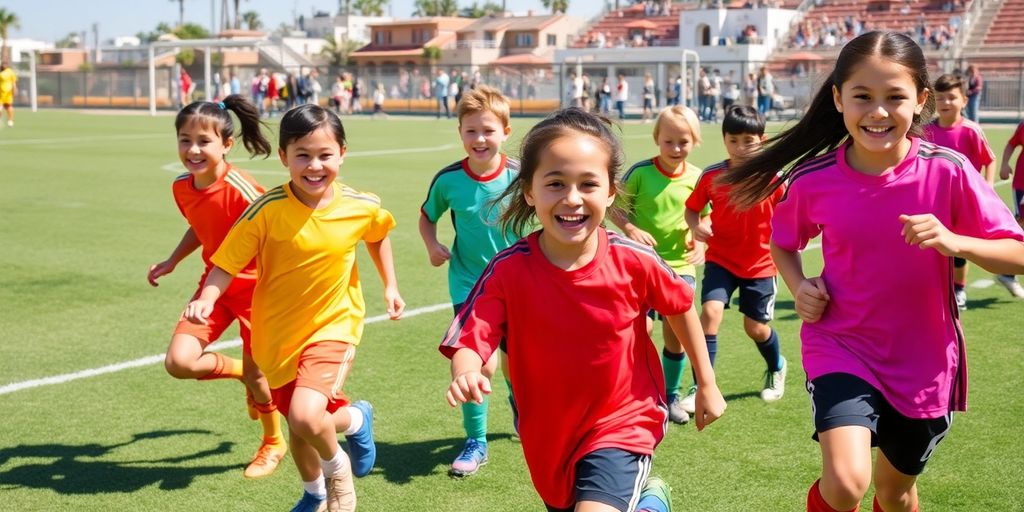Hey there, soccer parents and young athletes! If you’re in San Diego and looking to dive into the world of recreational soccer, you’ve come to the right place. This guide is all about exploring the various youth leagues and clinics around the city. Whether your child is just starting out or has been kicking the ball around for a while, there’s something here for everyone. From learning the basics to finding the perfect clinic, we’ve got you covered. Let’s get started on this soccer adventure!
Key Takeaways
- Rec soccer in San Diego offers a fun, less competitive environment for kids to enjoy the sport.
- There are several youth leagues available, each with unique offerings for different age groups.
- Clinics can help improve skills and introduce kids to the game in a supportive setting.
- Volunteer coaches play a crucial role in shaping young players’ experiences and development.
- Balancing soccer with other activities is important for a well-rounded childhood.
Understanding the Basics of Rec Soccer in San Diego
What is Rec Soccer?
Recreational soccer, or rec soccer, is all about having fun while learning the game. It’s usually less intense than club soccer and focuses on enjoyment, basic skills, and teamwork. In San Diego, rec soccer is a popular choice for families looking to introduce their kids to the sport without the pressure of high-stakes competition. The emphasis is on playing for fun, not just winning, which makes it a great starting point for many young athletes.
Benefits of Playing Rec Soccer
Playing rec soccer offers numerous benefits beyond just physical exercise. Kids learn to work as a team, develop social skills, and build confidence. Plus, it’s a fantastic way for kids to make friends and stay active. Parents often find that the flexible schedule fits well with their busy lives, allowing their children to participate in other activities as well.
- Teamwork: Kids learn to cooperate and communicate with others.
- Physical Fitness: Regular play improves cardiovascular health and coordination.
- Social Skills: Interacting with teammates helps build lasting friendships.
How Rec Soccer Differs from Club Soccer
Rec soccer is typically more relaxed compared to club soccer, which is more competitive and often requires tryouts. Rec teams are usually coached by volunteers and play in local leagues with a focus on skill development rather than winning. Club soccer, on the other hand, involves more travel, higher costs, and a greater time commitment.
In rec soccer, there’s no pressure to perform at a high level, making it ideal for beginners or those who simply enjoy playing the game. It’s about enjoying the sport and learning the basics, which sets a solid foundation for those who might want to pursue club soccer later on.
Top Youth Soccer Leagues in San Diego
Exploring youth soccer leagues in San Diego? You’ve got options. The city is packed with leagues that cater to every level of player, from beginners to those eyeing a future in competitive sports. Here’s a closer look at some of the top leagues.
San Diego Youth Soccer Association
The San Diego Youth Soccer Association is a big deal around here. It’s one of the largest youth soccer organizations in the region, offering programs for kids of all ages. They focus on skill development, teamwork, and sportsmanship. The association holds regular matches and tournaments, giving young players plenty of opportunities to shine on the field.
Coronado Youth Soccer League
Over on the island, the Coronado Youth Soccer League is making waves. Known for its tight-knit community feel, this league offers a range of programs that cater to different age groups and skill levels. The emphasis here is on having fun and learning the game, making it perfect for kids who are new to soccer.
Chula Vista Youth Soccer
Chula Vista Youth Soccer is another fantastic choice for families in the South Bay area. This league is all about inclusivity and making soccer accessible to everyone. With a mix of recreational and competitive teams, Chula Vista Youth Soccer provides a platform for young athletes to grow and develop their skills in a supportive environment.
In San Diego, youth soccer isn’t just a sport—it’s a community. Whether you’re in the bustling heart of the city or the serene suburbs, there’s a league ready to welcome your child with open arms. The friendships and skills they gain here will last a lifetime.
Finding the Right Soccer Clinic for Your Child
Types of Soccer Clinics Available
When it comes to soccer clinics in San Diego, parents are spoiled for choice. There are clinics focusing on different aspects of the game, from basic skills to advanced techniques. You can find clinics that cater to specific age groups, ensuring your child gets the right level of instruction. Some clinics offer more general training, while others may focus on goalkeeping, defensive skills, or even sportsmanship and teamwork. It’s important to choose a clinic that aligns with your child’s interests and skill level.
What to Look for in a Soccer Clinic
Choosing the right soccer clinic can feel overwhelming, but keeping a few things in mind can help. First, consider the instructors’ qualifications. Are they experienced in coaching children? Do they have a background in soccer? Next, look at the clinic’s structure. Does it offer a balanced mix of training and play? Finally, think about the logistics: location, schedule, and cost. A clinic that’s conveniently located and fits your schedule will make life easier for everyone involved.
Top Soccer Clinics in San Diego
San Diego is home to several top-notch soccer clinics. Here are a few that stand out:
- San Diego Soccer Academy: Known for its experienced coaches and comprehensive training programs.
- Youth Soccer Academy: Offers specialized clinics for different skill levels and positions.
- Future Stars Soccer Clinic: Focuses on developing young talent with a fun and engaging approach.
Finding the right clinic is about matching your child’s needs with what each program offers. Take the time to visit a few clinics, talk to the coaches, and observe a session if possible. This way, you can ensure your child not only learns but also enjoys their time on the field.
The Role of Coaches in Rec Soccer
Importance of Volunteer Coaches
Volunteer coaches are the backbone of recreational soccer. They bring passion and dedication, often stepping up without any formal training. Their commitment ensures that kids have the opportunity to play and learn in a supportive environment. Many volunteers are parents or community members who simply love the game and want to give back. They create a fun and encouraging atmosphere, helping kids to enjoy the sport without the pressure of high-stakes competition.
Training and Certification for Coaches
While enthusiasm is key, having some training can make a big difference. Many leagues offer basic training sessions to help volunteer coaches understand the fundamentals of coaching youth soccer. This might include learning how to run a practice, understanding age-appropriate drills, and ensuring player safety. Some organizations even offer certification programs that cover essential topics like group and individual instruction techniques, which can greatly enhance a coach’s effectiveness.
How Coaches Impact Player Development
Coaches play a crucial role in shaping young athletes. They not only teach soccer skills but also life lessons like teamwork, discipline, and resilience. A good coach can boost a child’s confidence and inspire a lifelong love of the game. Through programs like the Coach in Training, young players can even start to develop leadership skills, gaining insights into the game from a coaching perspective. This mentorship can be pivotal in a child’s development both on and off the field.
Coaches are more than just instructors; they are mentors who can ignite a passion for soccer in young players. Their influence often extends beyond the field, impacting kids’ lives in meaningful ways.
Balancing Soccer with Other Activities

Managing Schedules for Busy Families
Juggling soccer with other commitments can be tricky for families. With school, homework, and other hobbies, fitting in soccer practice and games requires a bit of planning. Creating a family calendar can help. Mark down all the important dates like practices, games, and school events. This way, everyone knows what’s coming up and can prepare ahead of time.
- Prioritize activities based on interest and commitment.
- Use digital tools or apps to keep track of schedules.
- Communicate with coaches about any potential conflicts.
The Importance of Rest and Recovery
Kids need time to rest, especially when they’re active in sports. Overloading their schedule can lead to burnout and injuries. Make sure they have downtime to relax and recover. Encourage them to listen to their bodies and take breaks when needed. Proper rest helps them perform better on the field and keeps them healthy.
Balancing activities isn’t just about fitting everything in; it’s about maintaining a healthy lifestyle for your child. Rest days are just as important as practice days.
Incorporating Other Sports and Hobbies
Playing different sports or engaging in various hobbies can be beneficial. It helps kids develop a wide range of skills and keeps them from getting bored. Encourage your child to try different sports or activities, like swimming or dance, alongside soccer. These can improve their overall athletic ability and keep things fresh and exciting.
- Explore seasonal sports like swimming in summer or basketball in winter.
- Encourage artistic hobbies such as painting or music.
- Support academic clubs or groups that interest your child.
Incorporating diverse activities ensures your child grows well-rounded and remains enthusiastic about their interests.
Safety and Health Considerations in Youth Soccer
Preventing Common Soccer Injuries
Youth soccer is a fantastic way for kids to stay active, but like any sport, it comes with its own set of risks. Sprains and strains are the most frequent injuries in soccer, often affecting ankles and knees. To help prevent these, ensure your child is wearing proper-fitting cleats and shin guards. Warm-ups and stretching exercises are crucial before hitting the field. Encourage kids to listen to their bodies and rest if something feels off. It’s also wise to have a basic first-aid kit on hand during games and practices.
Understanding Concussion Protocols
Concussions are a serious concern in youth sports, including soccer. It’s essential for coaches, parents, and players to recognize the signs of a concussion, which may include headaches, dizziness, or confusion. If a concussion is suspected, the child should be removed from play immediately and evaluated by a healthcare professional. Following a concussion, rest and gradual return to play under medical supervision is vital.
Ensuring Proper Hydration and Nutrition
Keeping kids hydrated, especially during hot San Diego days, is key to preventing heat-related illnesses. Encourage young players to drink water before, during, and after playing. Sports drinks can be useful for longer games, but water is typically sufficient for most activities. Nutrition also plays a role in performance and recovery. A balanced diet with plenty of fruits, vegetables, and lean proteins can help maintain energy levels and aid in recovery after matches.
"The health and safety of young athletes should always be a top priority. By focusing on injury prevention, understanding concussion risks, and promoting good nutrition and hydration, we can help ensure that youth soccer remains a safe and enjoyable activity for all participants."
Incorporating these practices can help make youth soccer a safer sport for everyone involved. Parents and coaches should work together to create an environment where kids can thrive both physically and mentally.
The Social Benefits of Playing Rec Soccer
Building Friendships Through Soccer
Playing recreational soccer is more than just running around a field; it’s about creating bonds that can last a lifetime. Kids meet peers from different backgrounds, learning to appreciate diversity and form friendships beyond their usual circles. These connections often extend beyond the field, fostering a sense of community and belonging. The shared experiences of victories, losses, and everything in between help cement these friendships.
Developing Teamwork Skills
In rec soccer, teamwork isn’t just encouraged—it’s essential. Every player learns the importance of working together towards a common goal. This environment nurtures cooperation and collaboration, skills that are crucial not just in sports but in life. Kids learn to trust their teammates, communicate effectively, and understand their role within a group, which are all vital skills that translate into everyday life.
Enhancing Communication Abilities
Communication is key in soccer, whether it’s calling for the ball or strategizing plays. Participating in rec soccer helps children develop these communication skills in a fun and engaging setting. They learn to articulate their thoughts clearly and listen to others, fostering an environment of mutual respect and understanding. These skills are invaluable, helping kids express themselves better and navigate social situations with ease.
Engaging in sports and teamwork significantly boosts children’s self-esteem by enhancing social interactions, fostering stronger relationships, and improving academic performance. These activities promote essential life skills and contribute to overall personal development. Learn more about this impact.
How to Get Involved as a Parent in Rec Soccer
Volunteering Opportunities
Getting involved in your child’s rec soccer experience can be incredibly rewarding, not just for them but for you too. Volunteering as a coach or team manager is one of the most direct ways to contribute. Many leagues rely heavily on parent volunteers to keep things running smoothly. You don’t have to be a soccer expert; enthusiasm and a willingness to learn can make a big difference. The National Academy of Athletics offers qualified training courses for volunteer parent coaches, which can help you feel more prepared and confident.
Supporting Your Child’s Soccer Journey
Being supportive goes beyond just cheering from the sidelines. It involves understanding their schedule, helping them practice at home, and encouraging them when they face challenges. Here are a few ways to support your child:
- Attend games and practices: Being there shows your child that you care about their interests.
- Help with drills at home: Simple passing or dribbling exercises can boost their skills.
- Encourage a balanced lifestyle: Remind them of the importance of rest and other activities.
Navigating Soccer Events and Tournaments
Soccer events and tournaments can be exciting but also overwhelming. They offer a chance to meet other parents and build a community around the sport. Here’s how you can make the most of these events:
- Plan ahead: Check schedules and locations early to avoid last-minute stress.
- Engage with other parents: Sharing experiences can provide support and tips for managing the soccer season.
- Celebrate achievements: Whether it’s a win or just a well-played game, acknowledging these moments can boost your child’s confidence.
Joining your child on their soccer journey is not just about the sport itself. It’s about building memories, learning together, and fostering a sense of community. The bonds formed on the field can last a lifetime, for both you and your child.
Exploring Soccer Facilities in San Diego
Best Soccer Fields and Parks
San Diego is home to a variety of soccer fields and parks that cater to both recreational and competitive play. Balboa Park and Mission Bay Park are two standout locations, offering ample space and well-maintained fields. These parks are perfect for families looking to enjoy a casual game or for those interested in more organized matches. Many local leagues and San Diego Surf Soccer camps also utilize these facilities for their events, providing top-notch training for players.
Indoor vs. Outdoor Soccer Facilities
While outdoor fields are abundant, indoor soccer facilities are gaining popularity in San Diego. They offer a controlled environment ideal for year-round play, especially during the colder months. Indoor facilities like the San Diego Sports Arena provide a great alternative for those looking to escape the elements and focus on skill development without weather interruptions.
Accessibility and Amenities for Families
When choosing a soccer facility, accessibility and amenities are key considerations for families. Most parks, like those used by North Clairemont Park and Rec youth soccer programs, offer ample parking, restrooms, and picnic areas. These features make it easier for families to enjoy a full day of activities without hassle. Additionally, many facilities are accessible by public transport, making them convenient options for those without personal vehicles.
San Diego’s soccer facilities are not just about the game; they provide a community space for families to gather, kids to play, and friendships to form. Whether you prefer the open air of a park or the controlled environment of an indoor arena, there’s a facility that fits your needs.
Seasonal Soccer Events and Tournaments
Annual Soccer Tournaments in San Diego
San Diego is a bustling hub for youth soccer, hosting several prestigious tournaments throughout the year. One of the standout events is the San Marcos United Cup, which attracts teams from all over the state. This tournament is open to boys and girls teams aged U7 to U19, offering a competitive yet friendly environment. Another key event is the Sol Thanksgiving Cup, providing a perfect blend of holiday spirit and soccer excitement. These tournaments not only showcase young talent but also foster community spirit and sportsmanship.
Seasonal Leagues and Competitions
In addition to tournaments, San Diego offers a variety of seasonal leagues that keep the soccer fever alive all year round. The leagues cater to different age groups and skill levels, ensuring every child has a chance to play and improve. With the introduction of San Diego FC in Major League Soccer, there’s a growing excitement and participation in local leagues, inspiring young players to dream big. These leagues emphasize not just competition, but also fun and learning, making soccer a delightful experience for kids and parents alike.
Special Soccer Events for Youth
San Diego’s soccer calendar is sprinkled with special events aimed at enriching the youth soccer experience. From skills clinics to friendly matches, these events are designed to hone players’ abilities while ensuring they have a great time. Volunteer coaches often lead these activities, bringing their passion and expertise to the field. Such events are crucial in helping young players develop their game while making lasting friendships. Parents are encouraged to participate and support, creating a vibrant community around youth soccer.
The Future of Rec Soccer in San Diego

Trends in Youth Soccer Participation
Youth soccer participation in San Diego is on the rise, reflecting a broader trend seen across the country. More kids are lacing up their cleats, eager to join teams and enjoy the game. This surge can be attributed to several factors, including increased access to local leagues and the growing visibility of soccer as a sport. Programs like Rising Stars San Diego are playing a critical role by offering tailored soccer experiences for young athletes, helping to fuel this growth.
Innovations in Soccer Training
Training methods are evolving rapidly, incorporating technology and new techniques to enhance player development. Coaches are now using apps and video analysis tools to provide instant feedback to players, making training sessions more interactive and effective. These innovations not only improve skills but also keep kids engaged and excited about the sport.
The Impact of Technology on Soccer
Technology is reshaping how soccer is played and experienced. From wearable devices that track performance metrics to virtual reality tools that simulate game scenarios, tech is becoming a staple in youth soccer. This tech-savvy approach is particularly appealing to the digital-native generation, offering them a modern twist on traditional training methods.
As soccer continues to grow in popularity, especially with events like the Coachella Valley Invitational highlighting the sport, the future of rec soccer in San Diego looks bright. With more kids participating and training techniques advancing, the city is poised to become a hub for young soccer talent.
Wrapping Up Our Soccer Adventure
So, there you have it! San Diego’s rec soccer scene is buzzing with opportunities for kids to dive into the game, make new friends, and just have a blast. Whether your child is just starting out or looking to hone their skills, there’s a league or clinic out there waiting for them. Remember, it’s not just about the goals or the wins; it’s about the joy of playing, learning, and growing. So lace up those cleats, hit the field, and let the soccer fun begin!
Frequently Asked Questions
What is rec soccer?
Rec soccer is a fun and less competitive way for kids to play soccer. It’s all about learning the game, making friends, and staying active without the pressure of winning every match.
How is rec soccer different from club soccer?
Rec soccer focuses on fun and skill-building with a relaxed schedule, while club soccer is more competitive, often involves tryouts, and requires a bigger time commitment.
What are the benefits of playing rec soccer?
Playing rec soccer helps kids stay fit, learn teamwork, make new friends, and develop important life skills like communication and cooperation.
How can I find a soccer league for my child in San Diego?
You can look for local leagues like the San Diego Youth Soccer Association or check community centers and schools for available programs.
What should I look for in a soccer clinic?
Look for clinics that focus on skill development, have qualified coaches, and create a positive and supportive environment for kids.
Are there any safety tips for youth soccer?
Ensure your child wears proper gear, stays hydrated, and warms up before playing. Also, be aware of concussion protocols and other safety guidelines.
How can parents get involved in rec soccer?
Parents can volunteer as coaches, help organize events, or simply support their child by attending games and practices.
What should I do if my child wants to try a different sport?
Encourage your child to explore their interests. You can attend games, watch videos, or visit local sports facilities to learn more before making a decision.

 Miguel Almirón Returns to Atlanta United: A Homecoming Celebration
Miguel Almirón Returns to Atlanta United: A Homecoming Celebration 